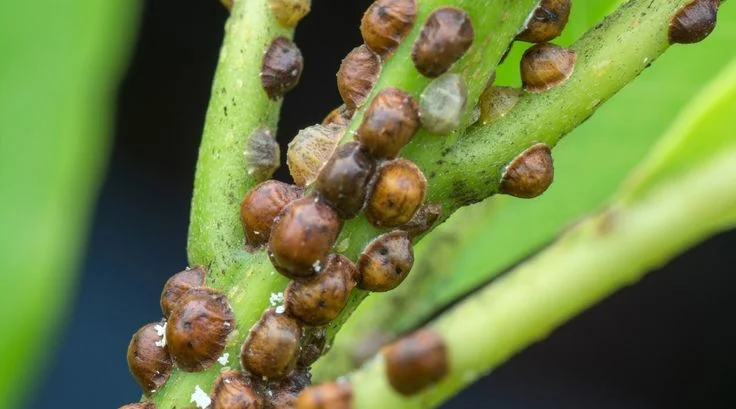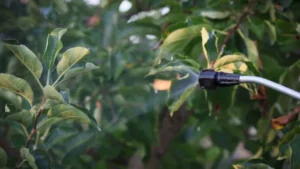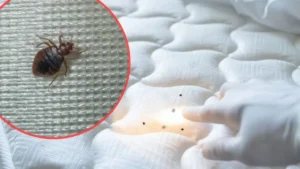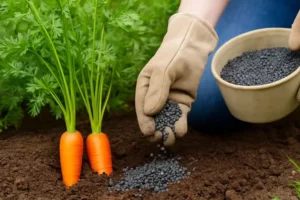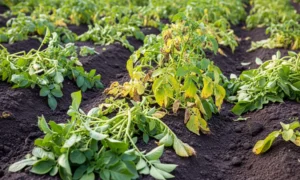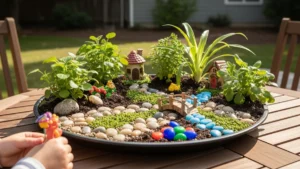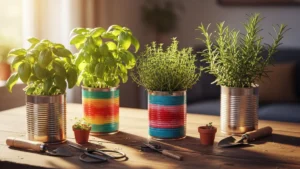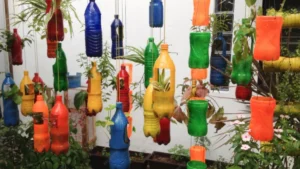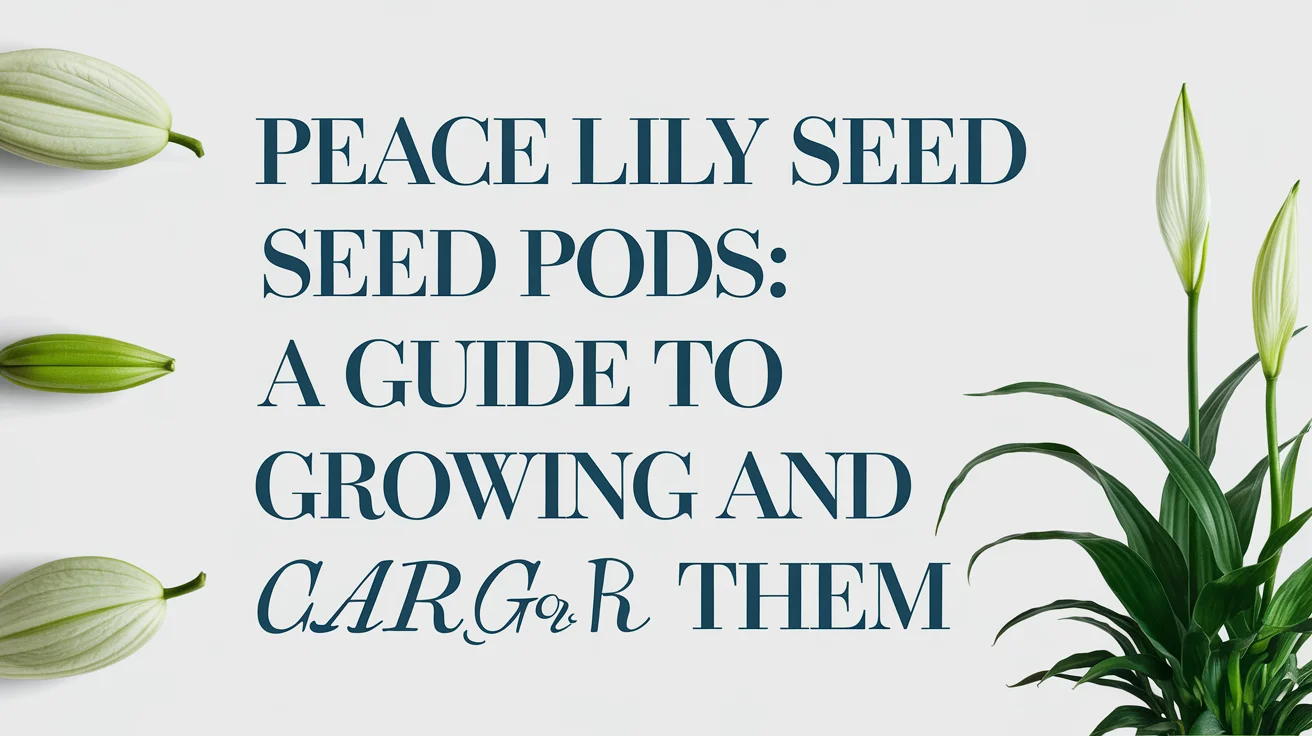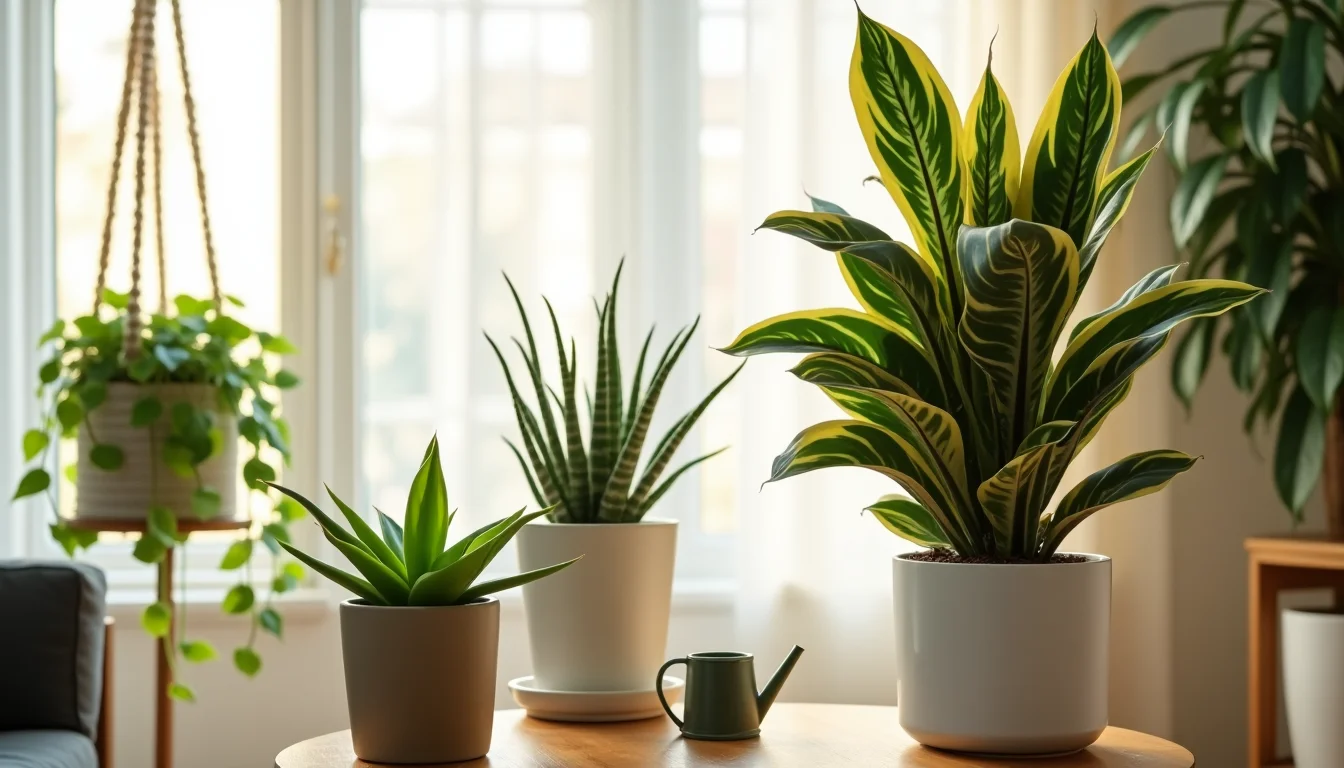What is scale on plants? Scale insects are common pests that attach themselves to leaves, stems, or branches, feeding on plant sap and causing a variety of issues. These tiny pests often appear as small bumps or raised spots and can go unnoticed until the infestation becomes severe. Scale can weaken plants, reduce growth, and even lead to leaf drop or death if left untreated.
Understanding scale on plants is essential for both novice and experienced gardeners. In this guide, we will explore the types of scale, signs of infestation, causes, effective treatments, and preventive measures to maintain healthy, thriving plants.
By learning how to identify and manage scale insects, you can protect your indoor and outdoor greenery from long-term damage.
Common Types of Scale on Plants
Understanding the common types of scale on plants is essential for effective pest management. Scale insects are generally divided into soft scales, hard scales, and mealybugs, each with unique characteristics and impacts on plant health. Soft scales are oval-shaped, often brown or tan, and secrete a sticky substance called honeydew, which can lead to sooty mold growth on leaves and stems.
Hard scales, also known as armored scales, have a rigid protective shell that makes them more resistant to treatment. They attach firmly to stems or leaves and feed on plant sap, often causing significant stress over time. Additionally, mealybugs, while technically distinct, are considered a special type of scale due to their similar feeding behavior and waxy, cotton-like coating.
They excrete honeydew, attract ants, and can stunt plant growth if not addressed promptly. By identifying which type of scale is present on your plants, you can choose the most appropriate control method and prevent further damage.
Soft Scale Insects and Their Impact on Plants
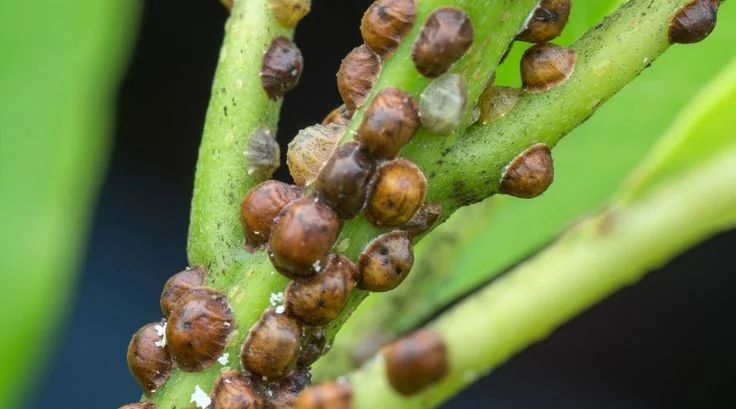
Soft scales are small, oval-shaped insects that secrete a waxy coating over their bodies. They often appear brown, tan, or gray and produce a sticky substance called honeydew, which can lead to sooty mold growth on leaves and stems. Soft scales typically move slowly and remain attached to one area of the plant for long periods, feeding continuously on sap.
Hard Scale Insects: A Major Cause of Leaf Damage
Hard scales, also known as armored scales, have a rigid, protective shell that makes them more difficult to treat. They appear as small, flat, or domed bumps on stems, leaves, or branches. Unlike soft scales, hard scales do not produce honeydew but can cause significant plant stress by sucking nutrients directly from the plant tissue.
Mealybugs and Similar Scale Pests
Although technically a separate insect, mealybugs share similarities with soft scale. They appear as white, cottony masses on leaves and stems and excrete honeydew, attracting ants and promoting fungal growth. Mealybugs are often included in discussions about scale due to their similar appearance and feeding behavior.
Common Causes of Scale on Plants
A scale infestation on plants often occurs due to several common causes that compromise plant health and make them more susceptible to pests. One primary cause is poor plant health, as stressed or weakened plants due to improper watering, nutrient deficiencies, or environmental stress are less able to resist scale insects.
Overcrowding is another contributing factor; plants placed too close together restrict airflow, increase humidity, and create ideal conditions for scale to thrive.
Additionally, a lack of natural predators like ladybugs or parasitic wasps allows scale populations to grow unchecked, particularly in indoor environments.
Finally, bringing infested plants into your garden or home can introduce scale insects, leading to rapid spread if new plants are not quarantined or inspected. Understanding these common causes is essential for taking proactive measures to prevent and manage scale infestations effectively.
Poor Plant Health
Plants that are stressed due to improper watering, nutrient deficiencies, or environmental conditions are more susceptible to scale infestations. Weak plants cannot resist pests as effectively as healthy, vigorous ones.
Overcrowding
Crowded plant arrangements restrict airflow and increase humidity, creating favorable conditions for scale insects. Tight spaces allow pests to move easily from one plant to another, accelerating infestations.
Lack of Natural Predators
In outdoor gardens, natural predators like ladybugs and parasitic wasps help control scale populations. Indoor plants often lack these predators, allowing scale populations to grow unchecked.
Transported Infested Plants
Scale can spread when infested plants are brought into your home or garden. Even a single infected plant can lead to a wider infestation if not quarantined and treated immediately.
Identifying Scale on Plants: Signs and Symptoms
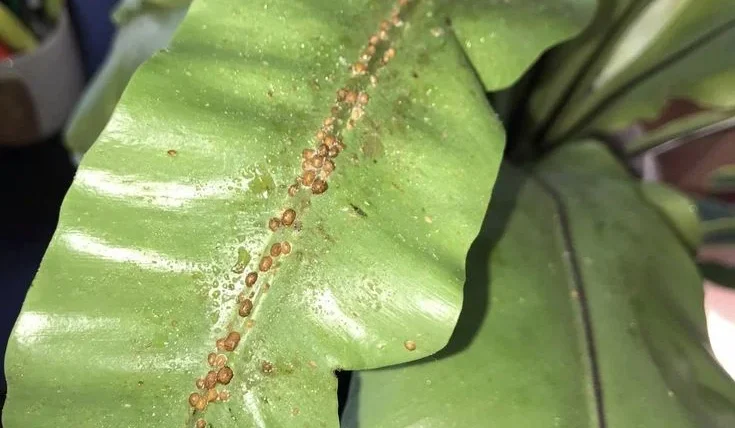
Recognizing scale on plants early is crucial for effective treatment and prevention of further damage. One of the most obvious signs is the presence of small, raised bumps on leaves, stems, or branches, which can vary in color from brown and gray to white, depending on the type of scale.
Yellowing leaves, stunted growth, and leaf drop often indicate that the plant is under stress from sap-sucking insects. Soft scales and mealybugs excrete a sticky substance called honeydew, which can attract ants and lead to the growth of black sooty mold, further reducing photosynthesis.
Curling or distorted leaves may also signal scale infestation, as feeding weakens plant tissues. Additionally, observing ants crawling on stems or leaves can be a strong indicator of hidden scale pests.
By identifying these signs and symptoms, gardeners can act promptly to protect their plants and maintain healthy growth.
Visible Bumps or Spots
The most obvious sign is the appearance of small, rounded bumps on leaves, stems, or branches. Soft scales are often raised and sticky, while hard scales are flatter and more rigid.
Yellowing Leaves and Stunted Growth
Scale feeding removes vital sap from plants, causing yellowing leaves, reduced vigor, and slowed growth. Prolonged infestations can result in leaf drop or branch dieback.
Honeydew and Sooty Mold
Soft scales and mealybugs excrete honeydew, a sticky substance that can attract ants and encourage black sooty mold. This mold further reduces photosynthesis and weakens the plant.
Presence of Ants
Ants are often a sign of scale infestation, as they feed on the honeydew produced by soft scales. Observing ants climbing stems or leaves can indicate a hidden pest problem.
Effective Solutions for Plants with Scale
You can manage plants with scale effectively by combining careful observation, targeted treatments, and preventive care. For minor infestations, remove individual scale insects manually using a soft brush, cloth, or a cotton swab dipped in rubbing alcohol.
Apply horticultural oils to smother both adult scales and their eggs, which reduces their population without harming the plant. Insecticidal soaps control soft scales and mealybugs safely when you apply them thoroughly to leaves and stems.
For severe infestations, use systemic insecticides, which the plant absorbs and delivers directly to feeding scale insects. In addition, provide proper care such as adequate watering, balanced fertilization, and sufficient light to strengthen plant resilience and prevent future infestations. For a detailed guide on identifying and managing these pests, see our comprehensive article on scale bugs on plants.
By monitoring your plants regularly and acting promptly at the first sign of scale, you keep them healthy, vibrant, and free from damaging pests.
Manual Removal of Scale on Plants
For small infestations, gently scrape off scales with a soft brush or cloth. This method works best on hard scales and can prevent further spread when combined with other treatments.
Using Horticultural Oils to Treat Plant Scale
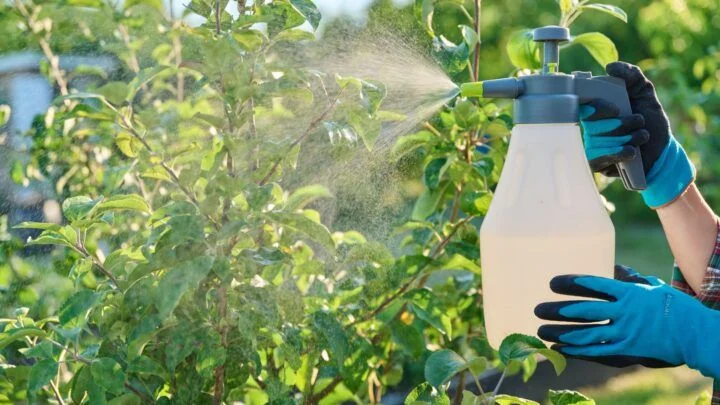
Applying horticultural oil smothers scale insects and their eggs. Oils work by coating the pests and blocking their breathing pores, effectively controlling populations. Follow product instructions carefully to avoid leaf burn.
Insecticidal Soaps for Controlling Scale
Insecticidal soaps are effective for soft scales and mealybugs. Spray thoroughly on affected areas, ensuring coverage of both the tops and undersides of leaves. Repeat applications may be necessary for complete eradication.
Systemic Insecticides for Severe Scale Infestations
For severe infestations, systemic insecticides can be used. These products are absorbed by the plant and target feeding insects, offering long-term protection. Use with caution and follow all safety guidelines.
Preventive Measures for Scale on Plants
- Quarantine New Plants: Isolate new plants for at least two weeks before introducing them to your garden or home.
- Maintain Plant Health: Water properly, provide adequate nutrients, and avoid stress to improve plant resistance.
- Regular Inspection: Check leaves, stems, and branches weekly for early signs of scale.
- Encourage Natural Predators: Outdoors, attract beneficial insects such as ladybugs and parasitic wasps.
- Proper Spacing: Ensure adequate spacing between plants to improve airflow and reduce humidity.
FAQs
What is scale on plants?
Scale on plants refers to small sap-sucking insects that attach to leaves, stems, or branches, often appearing as bumps or spots.
Are scale insects harmful?
Yes, they weaken plants by sucking sap, reducing growth, causing yellowing leaves, and promoting fungal issues.
How do I get rid of scale on indoor plants?
Use manual removal, horticultural oils, insecticidal soaps, or systemic insecticides, depending on the severity of the infestation.
Can scale infestations be prevented?
Yes, maintaining healthy plants, quarantining new additions, inspecting regularly, and encouraging natural predators can help prevent scale problems.
Do scale insects spread quickly?
They can spread rapidly, especially in crowded plant arrangements or indoor settings without natural predators.
What is Scale on Plants: Conclusion
Understanding what is scale on plants is essential for gardeners who want to maintain healthy, thriving greenery. Scale insects, whether soft, hard, or mealybug-like, can cause significant stress and damage if left untreated.
Understanding what is scale on plants is essential for gardeners who want to maintain healthy, thriving greenery. Scale insects, whether soft, hard, or mealybug-like, can cause significant stress and damage if left untreated.
By recognizing early signs, applying effective treatments such as manual removal, horticultural oils, or insecticidal soaps, and implementing preventive measures, gardeners can protect their indoor and outdoor plants from infestation. For example, monitoring plant health can help prevent issues like rubber tree leaves falling off, which can sometimes indicate scale or other pest problems.
Consistent care and vigilance are key to preventing scale from compromising plant health.For more expert guidance on managing scale insects and other common plant pests, visit The Spruce – Scale Insects on Plants.

